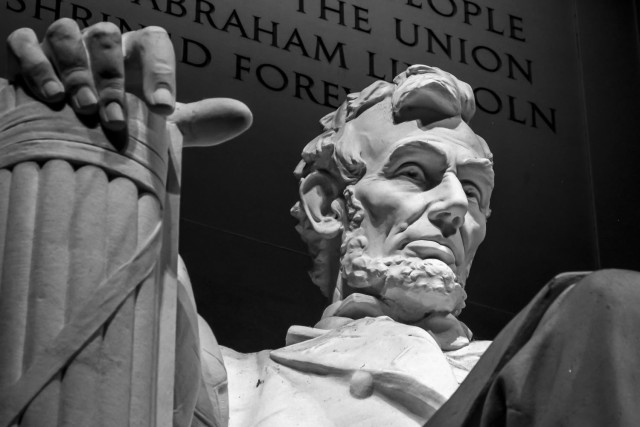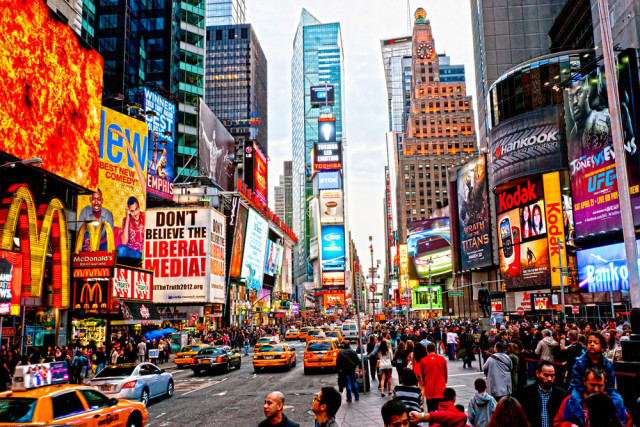Lots of people do lots of things I wish they wouldn’t. And lots of people don’t do lots of things I wish they would. In fact, I’m rather certain the world would be a better place for me and people just like me if more people were willing to go along with my desires and tastes, instead of stubbornly pursuing their own thing.
Take drinking tons of soda. For the life of me, I can’t figure out why people consider sugar water a multiple-times-a-day beverage. It’s like wanting to pour chocolate sauce on everything, or eat brownies with every meal. In short, to my sensibilities, it’s gross. And it’s way less healthy than drinking water — which tastes a whole lot better, too.
Part of being civilized — arguably most of being civilized — is recognizing that different people do things differently and that such differences deserve respect. Respecting difference means allowing behaviors we find disagreeable, provided those behaviors don’t cause us harm. This covers big stuff like religious toleration — those people of other faiths sure do eat weird things and have a funny way of talking, but that’s their business — to, yes, even the dreadful behavior of drinking half-a-dozen Cokes a day.
Of course, civilized people aren’t prevented from making their opinions known. I just did, with my quips about soda, and if I happen to see you drinking one, I’m free to tell you what I think. (Though I risk coming across as an officious jerk if I’m not careful.) What civilized people don’t do is hit each other with clubs over such differences.
That’s why the paternalism Sarah Conly offers three cheers for in the pages of the New York Times amounts to a rah-rah for barbarism. Conly, an assistant professor of philosophy at Bowdoin College and author of Against Autonomy: Justifying Coercive Paternalism, wants those upstanding chaps of the NYPD to flex their might to stop Americans from getting so fat.
To support her preference for state interference, Conly turns to the great classical liberal John Stuart Mill.
In his great work, On Liberty, Mill advances the “harm principle” as a crucial limit on the authority of the state:
The only purpose for which power can be rightfully exercised over any member of a civilised community, against his will, is to prevent harm to others. His own good, either physical or moral, is not a sufficient warrant. He cannot rightfully be compelled to do or forbear because it will be better for him to do so, because it will make him happier, because, in the opinions of others, to do so would be wise, or even right.
Which sounds pretty bad for the soda ban. But not so fast, Conly says. She tells us Mill endorsed preventing our freely chosen actions “when we are acting out of ignorance and doing something we’ll pretty definitely regret. You can stop someone from crossing a bridge that is broken, he said, because you can be sure no one wants to plummet into the river.”
From that, she gets to the idea that, because people underestimate the dangers of drinking lots of soda, they’re (often/usually) acting out of ignorance when they drink it, and so we’re justified in at the very least making it much more difficult for them to consume the stuff in bulk.
But read the full passage from Mill:
If either a public officer or any one else saw a person attempting to cross a bridge which had been ascertained to be unsafe, and there were no time to warn him of his danger, they might seize him and turn him back, without any real infringement of his liberty; for liberty consists in doing what one desires, and he does not desire to fall into the river.
Nevertheless, when there is not a certainty, but only a danger of mischief, no one but the person himself can judge of the sufficiency of the motive which may prompt him to incur the risk: in this case, therefore (unless he is a child, or delirious, or in some state of excitement or absorption incompatible with the full use of the reflecting faculty), he ought, I conceive, to be only warned of the danger; not forcibly prevented from exposing himself to it.
It seems Conly left out the bit about such interference requiring first “no time to warn him of his danger.” Nor does she seem at all bothered by the important limit that, “when there is not a certainty, but only a danger of mischief, no one but the person himself can judge of the sufficiency of the motive which may prompt him to incur the risk.”
Even accounting for the cognitive biases — which Conly says, if only he’d known about them, would’ve led Mill to support soda nannyism — it’s difficult to square the harm caused by a large Coke with the imminent danger and certainty of effect needed to override the harm principle.
In fact, a great deal of On Liberty seems perfectly aimed at exposing the immorality of Conly’s paternalism. She should’ve read not only the rest of that passage, but also the rest of On Liberty. Mill warns of an increasing inclination to stretch unduly the powers of society over the individual, both by the force of opinion and even by that of legislation: and as the tendency of all the changes taking place in the world is to strengthen society, and diminish the power of the individual, this encroachment is not one of the evils which tend spontaneously to disappear, but, on the contrary, to grow more and more formidable.
The disposition of mankind, whether as rulers or as fellow-citizens to impose their own opinions and inclinations as a rule of conduct on others, is so energetically supported by some of the best and by some of the worst feelings incident to human nature, that it is hardly ever kept under restraint by anything but want of power; and as the power is not declining, but growing, unless a strong barrier of moral conviction can be raised against the mischief, we must expect, in the present circumstances of the world, to see it increase.
This “mischief” results from that urge to have others prefer the same thing we prefer, to have others behave the way we behave. But, like I said above and like Conly seems to forget, civilization means recognizing the primacy of individual choice, even choices we think silly.
There is no reason that all human existences should be constructed on some one, or some small number of patterns. If a person possesses any tolerable amount of common-sense and experience, his own mode of laying out his existence is the best, not because it is the best in itself, but because it is his own mode.
Human beings are not like sheep; and even sheep are not undistinguishably alike. A man cannot get a coat or a pair of boots to fit him, unless they are either made to his measure, or he has a whole warehouseful to choose from: and is it easier to fit him with a life than with a coat, or are human beings more like one another in their whole physical and spiritual conformation than in the shape of their feet?
If it were only that people have diversities of taste, that is reason enough for not attempting to shape them all after one model. But different persons also require different conditions for their spiritual development; and can no more exist healthily in the same moral, than all the variety of plants can in the same physical, atmosphere and climate.
The same things which are helps to one person towards the cultivation of his higher nature, are hindrances to another. The same mode of life is a healthy excitement to one, keeping all his faculties of action and enjoyment in their best order, while to another it is a distracting burthen, which suspends or crushes all internal life.
Such are the differences among human beings in their sources of pleasure, their susceptibilities of pain, and the operation on them of different physical and moral agencies, that unless there is a corresponding diversity in their modes of life, they neither obtain their fair share of happiness, nor grow up to the mental, moral, and aesthetic stature of which their nature is capable.
Is drinking large sodas a way of life, though? Conly mocks the idea: “Large cups of soda as symbols of human dignity? Really?” But consider that if you drink 32 ounces of Coca-Cola, you’ll rack up 388 calories. A 20-ounce Iced White Chocolate Mocha from Starbucks has 500. Both aren’t good for you, but the Mocha’s worse. The difference is that the kinds of people who want to use government to save ignorant Americans from the harms of soft drinks are the kinds of people who prefer an Iced White Chocolate Mocha to a Coca-Cola.
That Conly calls for a ban on Cokes and not Mochas indicates that what really bothers her is the behavior of those low-brow folks who slam giant soft drinks, but not so much the worse behavior of the middle-class and educated who just can’t start the day without a latte. About this tendency to use ourselves as the moral yardstick, Mill noted, “our idea of improvement chiefly consists in persuading or forcing other people to be as good as ourselves.”
So the real trouble is people aren’t acting like Conly — or the majority Conly imagines agrees with her — would like them to. Thus it’s time to call in the law. To which Mill says this:
A theory of “social rights,” the like of which probably never before found its way into distinct language — being nothing short of this — that it is the absolute social right of every individual, that every other individual shall act in every respect exactly as he ought; that whosoever fails thereof in the smallest particular, violates my social right, and entitles me to demand from the legislature the removal of the grievance.
So monstrous a principle is far more dangerous than any single interference with liberty; there is no violation of liberty which it would not justify; it acknowledges no right to any freedom whatever, except perhaps to that of holding opinions in secret, without ever disclosing them: for the moment an opinion which I consider noxious, passes any one’s lips, it invades all the “social rights” attributed to me by the Alliance.
The doctrine ascribes to all mankind a vested interest in each other’s moral, intellectual, and even physical perfection, to be defined by each claimant according to his own standard.
To which Conly likely offers another three cheers. Especially when the individual rights she wants violated in the name of social rights are so, well,dumb. “As irritating as it may initially feel, the soda regulation is a good idea,” she writes. “It’s hard to give up the idea of ourselves as completely rational. We feel as if we lose some dignity. But that’s the way it is, and there’s no dignity in clinging to an illusion.”
Writing in The Subjection of Women — regarding a different group then burdened with the charge of irrationality — Mill had this to say about a Conly-style disregard for personal choice: “The yoke is naturally and necessarily humiliating to all persons, except the one who is on the throne, together with, at most, the one who expects to succeed to it.”
Conly may cheer the power of the throne, but the civilized among us should not.
This essay first appeared at Libertarianism.org.
 Aaron Ross Powell
Aaron Ross Powell
Aaron Ross Powell is a research fellow and editor of Libertarianism.org.




























